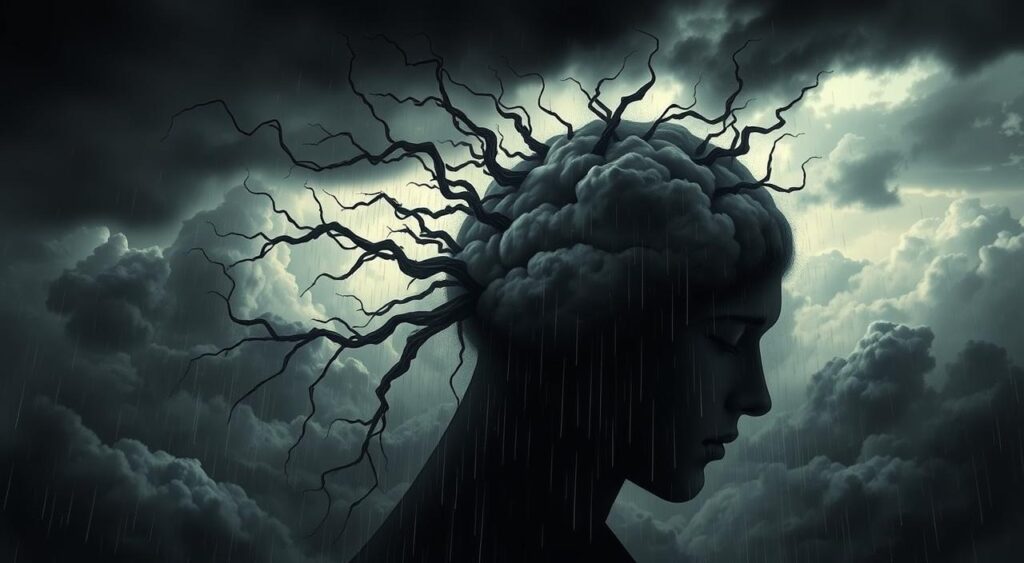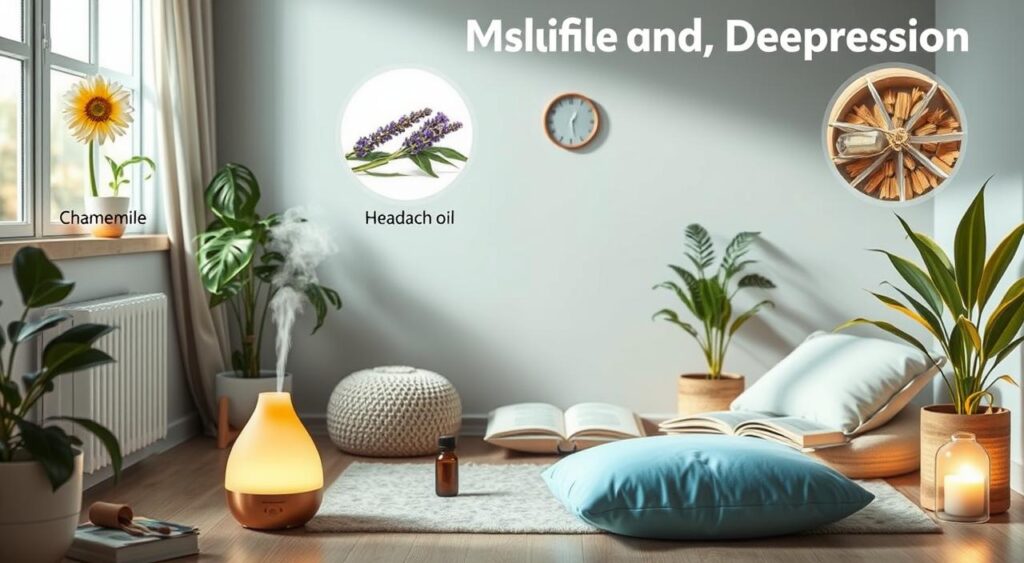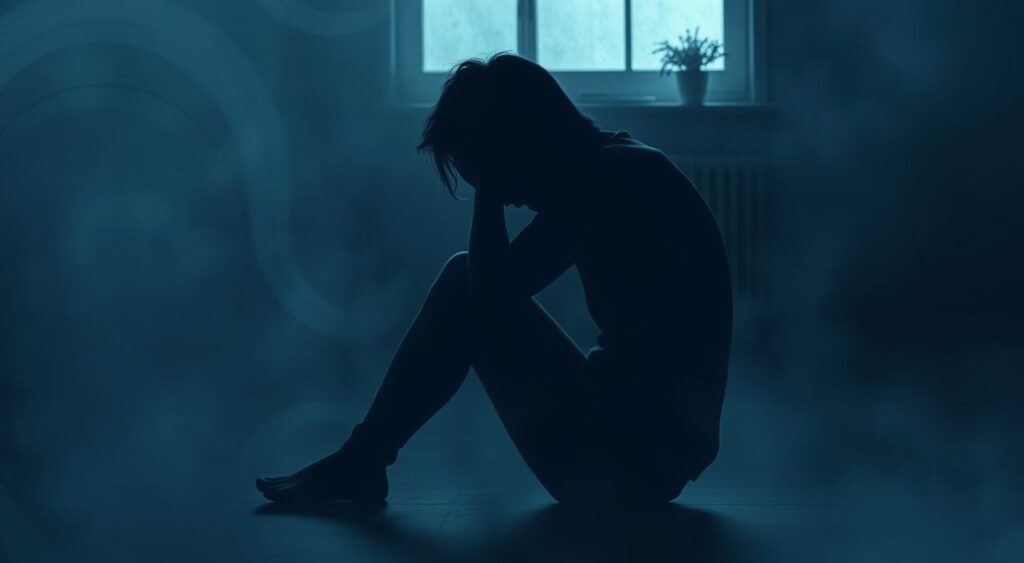About 80% of people with depression also have headaches. This shows a strong link between the two. Depression and headaches can make each other worse. It’s important to understand this to treat both conditions well.
Studies show that people with depression often get headaches, and vice versa. This means treating both conditions together is key. By seeing how depression and headaches are connected, doctors can give better care.

We will look deeper into this connection. We’ll talk about the types of headaches linked to depression, what triggers them, and how to treat them. We’ll also explore natural ways to help.
Key Takeaways
- Headache in depression is a common comorbidity, affecting approximately 80% of individuals with depression.
- Depression and headache can exacerbate each other, making it essential to address both conditions in treatment plans.
- Understanding the connection between headache in depression and depression and headache is crucial for effective management and treatment.
- Recognizing the interplay between these two conditions can help healthcare providers develop more comprehensive approaches to care.
- Addressing both depression and headache is vital for improving overall mental health and quality of life.
The Complex Relationship Between Headaches and Depression
Headaches and depression often go hand in hand. Many people with depression also experience headache symptoms in depression. Studies show that depression can make people more sensitive to pain, including headaches. This connection is due to shared brain pathways and neurotransmitters.
The link between mood disorders and pain is key. Research points out that brain areas that control mood also handle pain. This overlap can lead to headaches in those with depression.
How Depression Affects Physical Pain
Depression can change how we feel pain in several ways:
- Increased sensitivity to pain stimuli
- Altered pain perception and processing
- Reduced pain tolerance
The Neurological Connection
The connection between headaches and depression is complex. Shared neurotransmitters like serotonin and dopamine are important. They help with mood and pain processing.
Common Patterns and Presentations
Headaches in depression can vary. They can be tension headaches, migraine headaches, or chronic daily headaches. Knowing these patterns helps in diagnosing and treating effectively.
Understanding Headache in Depression as a Dual Condition
Headache in depression is a complex issue that needs a full approach to manage. When headaches and depression happen together, it makes diagnosis and treatment harder. Research has shown that people with depression often get headaches, and those with headaches are more likely to feel depressed.
It’s important to treat both conditions at the same time. Addressing both conditions simultaneously is key for better management and a better life. This might include medicine, therapy, and changes in lifestyle.
Some important things to think about when managing headache in depression include:
- Identifying and addressing underlying triggers and risk factors
- Developing a personalized treatment plan that takes into account the individual’s unique needs and circumstances
- Encouraging open communication and collaboration between healthcare providers and patients
By treating the whole person, not just the symptoms, people with headache in depression can see real improvements.
As noted by the National Institute of Mental Health, “depression and headache are two of the most common conditions that co-occur in the general population.”
| Condition | Prevalence | Treatment Options |
|---|---|---|
| Headache | Up to 75% of individuals with depression | Medication, lifestyle modifications, therapy |
| Depression | Up to 50% of individuals with headaches | Medication, therapy, lifestyle modifications |
Types of Headaches Associated with Depression
Headaches in depression can be different for everyone. It’s important to know the various types of headaches linked to depression. This knowledge helps in managing these headaches effectively.
People with depression often face headaches that range from mild to severe. The link between headaches and depression is complex. Knowing the specific headache type is key to better symptom management.
Tension Headaches
Tension headaches are common in depression. They feel like a dull ache on both sides of the head. Stress, anxiety, and emotional factors can trigger them.
Migraine Headaches
Migraines are another headache type linked to depression. They cause severe, throbbing pain. This pain is often worsened by light and sound, making them very debilitating.
Chronic Daily Headaches
Chronic daily headaches happen often, sometimes every day. They can be a sign of depression. Managing these headaches can be tough and may need a detailed treatment plan.
Knowing the different headaches linked to depression is a big step towards managing symptoms. Recognizing these headaches is key to effective treatment and recovery.
Identifying Triggers and Risk Factors
Headache triggers in depression can be complex and varied. It’s key to understand the factors that lead to them. Identifying these triggers is crucial for managing and preventing headaches. Common triggers include sleep issues, diet, and lack of exercise.
People with depression may face headache triggers in depression due to lifestyle factors. These include irregular sleep, poor diet, and not enough exercise. Also, some depression meds can affect headache patterns. So, it’s important to watch and adjust treatment plans.
To grasp the link between headache triggers in depression and lifestyle, consider this:
- Sleep disturbances: Irregular sleep can make headaches worse. It’s vital to keep a regular sleep schedule.
- Dietary habits: Some foods and drinks can trigger headaches. These include caffeine, sugar, and gluten.
- Physical inactivity: Regular exercise can help reduce stress and ease headache symptoms.
By recognizing and tackling these headache triggers in depression, people can manage their condition better. This can help reduce headache frequency and severity.
| Trigger | Description |
|---|---|
| Sleep disturbances | Irregular sleep patterns can exacerbate headaches |
| Dietary habits | Certain foods and beverages can trigger headaches |
| Physical inactivity | Regular exercise can help reduce stress and alleviate headache symptoms |
The Impact of Depression on Headache Severity
Depression can make headaches worse, making managing headache with depression very hard. People with depression often feel muscle tension, pain differently, and have trouble sleeping. These issues can make headache in depression even more severe.
Several factors can make headaches worse in people with depression:
- Physical symptoms: Muscle tension, fatigue, and sleep problems can make headaches worse.
- Emotional components: Feeling hopeless, anxious, and irritable can make headaches feel worse.
- Behavioral changes: Staying away from people, being less active, and poor coping can also worsen headaches.
Knowing these factors is key to finding ways to manage headache with depression. By tackling both physical and emotional issues, people can handle their headaches better. This can also improve their life quality.
It’s important to see that headache in depression is a complex issue. It needs a treatment plan that includes medicine and lifestyle changes. By understanding how depression and headaches are connected, people can start to get help and manage their symptoms.
Medical Treatment Approaches
For those with headaches due to depression, several medical treatments can help. Headache treatment for depression often combines medicines and lifestyle changes. Antidepressants, like SSRIs, can help with mood and headaches.
Pain relievers, triptans, and preventive meds are also used. The right medicine depends on the headache type and the person’s health. It’s key to work with a doctor to find the best treatment and watch for side effects.

Some common medications for headache treatment for depression include:
- Antidepressants: SSRIs, tricyclic antidepressants (TCAs), and monoamine oxidase inhibitors (MAOIs)
- Pain relievers: acetaminophen, ibuprofen, and aspirin
- Triptans: sumatriptan, rizatriptan, and eletriptan
- Preventive medications: beta blockers, anticonvulsants, and corticosteroids
Talking regularly with your healthcare provider is important. This ensures you get the safest and most effective treatment. Together, you can manage your headaches and depression, improving your life quality.
| Medication | Type | Common Use |
|---|---|---|
| SSRIs | Antidepressant | Treating depression and anxiety |
| Triptans | Pain reliever | Treating migraines and cluster headaches |
| Beta blockers | Preventive medication | Preventing migraines and reducing blood pressure |
Natural Remedies and Lifestyle Modifications
For those dealing with headaches and depression, natural remedies and lifestyle changes can help. These methods can reduce symptoms and boost overall health.
What you eat matters a lot for managing headaches in depression. Foods high in sugar, salt, and unhealthy fats can make symptoms worse. But, foods full of omega-3 fatty acids, vitamins, and minerals can help. Regular exercise is also key. It can lessen headache frequency and improve mood.
Dietary Considerations and Stress Management
Some important dietary tips for headache relief in depression include:
- Avoiding trigger foods, such as gluten and dairy
- Increasing consumption of omega-3 rich foods, such as salmon and walnuts
- Staying hydrated by drinking plenty of water
Stress management is also vital. Techniques like mindfulness meditation and progressive muscle relaxation can help. These methods can be used alongside medical treatment for better headache relief.
Exercise and Physical Activity
Regular exercise is crucial for managing headaches in depression. Activities like walking, yoga, and swimming can help. They reduce headache frequency and improve mood. By making dietary changes, exercising, and managing stress, individuals can actively manage their headaches and depression. This approach leads to better headache relief.
| Remedy | Benefits |
|---|---|
| Dietary Changes | Reduced headache frequency and severity |
| Exercise and Physical Activity | Improved mood and reduced headache frequency |
| Stress Management Techniques | Reduced headache severity and improved overall well-being |
When to Seek Professional Help
Dealing with headache in depression is tough. Knowing when to get help is key. If your headaches are severe, change suddenly, or your depression gets worse, see a doctor.
A doctor can create a plan to help with your headache in depression. They might suggest medicine, therapy, or changes in your lifestyle. It’s important to find a doctor who gets how headaches and depression are linked.
Warning Signs
- Severe or sudden onset headaches
- Changes in headache patterns
- Worsening depressive symptoms
- Suicidal thoughts or feelings
Finding the Right Healthcare Provider
Looking for the right doctor is crucial. You might want to see a neurologist, psychiatrist, or headache specialist. Talking openly with your doctor is key to a good treatment plan.

Getting help is the first step to managing headache in depression and feeling better. If you see warning signs or can’t handle your symptoms, don’t wait to reach out to a doctor.
| Healthcare Provider | Specialization |
|---|---|
| Neurologist | Headaches and neurological disorders |
| Psychiatrist | Depression and mental health disorders |
| Headache Specialist | Headaches and migraine disorders |
Building a Support System for Long-term Management
Managing headache with depression needs a full plan. This includes medical care, lifestyle changes, and emotional support. A strong support system is key for long-term success. It gives a sense of belonging and connection, helping to fight off feelings of loneliness.
Family and friends can offer a lot of help. They provide emotional support, practical help, and encouragement. Joining a support group, whether in-person or online, is also great. It lets people share their stories and strategies with others facing similar issues.
Some good things about joining a support group include:
- Connecting with others who get what you’re going through
- Sharing experiences and strategies
- Getting emotional support and encouragement
Working with a therapist or counselor is also beneficial. They teach you tools and skills to handle symptoms and develop coping strategies. With a strong support system, managing headache with depression becomes easier, leading to a better life.
Building a support system is vital for managing headache with depression. Surrounding yourself with caring people who understand you helps you feel supported and empowered to manage your health.
Conclusion: Taking Control of Your Health Journey
As we wrap up our look at headaches and depression, remember you have the power to control your health. The link between these two is complex, but you can manage them both. With the right steps, you can tackle your headaches and depression.
Work with your healthcare team to create a treatment plan that covers all your symptoms. Make lifestyle changes like managing stress, exercising regularly, and eating well. Also, have a strong support system of family, friends, and mental health experts.
You’re not alone in this fight. With hard work and determination, you can take back your health and live a happy life. Start your journey of self-care and healing today.
FAQ
Q: What is the connection between headaches and depression?
A: Headaches and depression are linked in complex ways. Depression can make people more sensitive to pain, leading to more headaches. Both conditions affect the brain and share similar pathways.
People with depression often get different kinds of headaches. These include tension-type, migraine, and chronic daily headaches.
Q: How can depression impact the severity of headaches?
A: Depression can make headaches worse. Physical symptoms like muscle tension can increase pain. Emotional feelings like hopelessness and anxiety also play a role.
Behavioral changes, like staying away from people and being less active, can make headaches worse too.
Q: What are the common types of headaches associated with depression?
A: Depression is often linked with tension headaches, migraine headaches, and chronic daily headaches. Each type can affect people differently. The frequency and intensity of headaches can change based on depression symptoms.
Q: What are some potential triggers and risk factors for headaches in individuals with depression?
A: Triggers for headaches in depression include sleep problems, bad eating habits, and not being active. Stress and certain depression medicines can also cause headaches.
Q: How can medical treatment approaches help manage headaches in depression?
A: Doctors might use antidepressants, pain relievers, and other medicines to help. It’s key to work with a doctor to find the right treatment. This might include using more than one medicine.
Q: What natural remedies and lifestyle modifications can help provide headache relief in depression?
A: To help with headaches, try eating right, staying active, and managing stress. Mindfulness and cognitive-behavioral strategies can also help. These methods can ease headaches and improve mood.
Q: When should someone with depression seek professional help for their headaches?
A: If headaches are severe, sudden, or get worse, seek help. It’s important to find a healthcare provider who knows about headaches and depression. This ensures a good treatment plan.
Q: How can building a support system help with the long-term management of headaches in depression?
A: Having a strong support system is key. Family, friends, and support groups can offer emotional support. Sharing strategies and getting help from a therapist can also be helpful.
